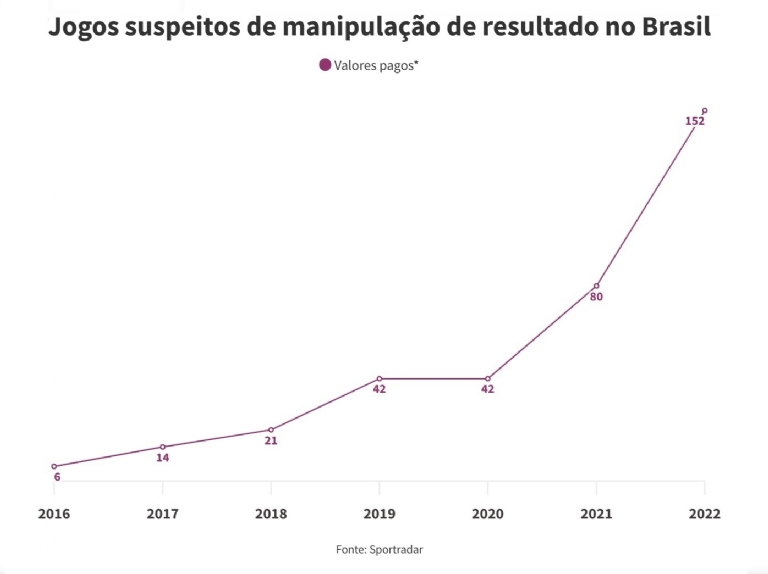

During the period of the covid-19 pandemic, fraud increased even more according to data from the UNODC (United Nations Office on Drugs and Crime), the IOC (International Olympic Committee) and Interpol, in a survey carried out in 2020.
But the fight against fraud is also increasing. In the United Kingdom, in 2005, the Gambling Act 2005 was introduced, intended to control all forms of gaming, including betting. On the last 13th, the Premier League announced the decision to ban sponsorships of bookmakers on the front of the shirts of football clubs, in a measure that will come into force in the future.
In 2017, FIFA reached an agreement with the Swiss company Sportradar, a world leader in sports technology, which provides data to clubs, federations, media groups and bookmakers. Conmebol, UEFA, CBF and some federations in Brazil also use the company's system, which monitors all matches.
Technology against fraud
Used by Sportradar, the Universal Fraud Detection System (UFDS) detects irregular and suspicious betting patterns. The system is powered by machine-learning algorithms, artificial intelligence (AI) and a constantly updated betting database, which collects real-time information from more than 600 global betting operators in order to detect possible manipulations. In 2022, more than 850,000 sports matches around the world were analyzed.
When some suspicious games are detected by the system, they are analyzed by the company's integrity specialists. From there, Sportradar informs the competent sporting body, such as FIFA, Conmebol or CBF, which also analyzes the case. In São Paulo, the Paulista Federation has an Integrity Committee, made up of prosecutors, lawyers, Civil Police and Federal Police delegates.
The committee was created in 2015 by the lawyer specialized in sports law Paulo Schmitt, current president of the body. In addition to working on the analysis of suspected cases, the Integrity Committee developed a booklet for clubs and players aimed at preventive and repressive actions.
In recent years, through these actions, both the Paulista Federation and the CBF have been receiving complaints from players about possible fraud. In some cases, athletes are instructed to follow conversations with the recruiters so that the police can obtain more details and take more effective actions.
After identification and analysis, then, by the sports bodies, the cases are taken to judicial and police authorities, Public Ministries of the states in Brazil and then to the Courts of Sports Justice (TJD), also of each state, and to the Superior Court of Sports Justice (STJD).
One of the problems of this whole process, currently, is the delay in concluding cases. The MP of Goiás, through the ‘Operation Maximum Penalty’, which began at the end of 2022 with Serie B games, disclosed cases involving matches and players from Serie A clubs of the Brasileirão 2022 almost six months after the end of the competition.

How grooming is done
In Brazil, the regulation of bookmakers has not yet been approved by the Federal Government. Despite this, they continue to operate, with an increasing presence in the lives of Brazilians, especially in the sports world. As many of these houses are not headquartered in Brazil, inspection is still very poor, giving rise to more and more fraud and crimes by recruiters.
According to Sportradar, suspicious games usually come from lower division matches, with 52% of them from third division championships and regional leagues. In the past, as in the case of the so-called ‘Mafia do Apito’ in 2005, bookmakers were interested in the final result of matches. Today, that has changed. So as not to show too much, the recruiters are looking for players from these smaller leagues to try to gain in the number of corners and bookings.
On betting sites, it is possible, in addition to these options, to choose a range of betting possibilities. From the author of the first goal, how the goal will be scored, when the next throw-in will be and the winner of each half. Some football matches reach more than 300 betting options.
In the most common cases, criminals make contact with players through social networks or even the athletes' WhatsApp, offering amounts between R$5,000 and R$50,000 (US$ 1,000 to US$ 10,000), so that they commit penalties, force cards and corners, and also help their own team deliver the game. Many times, Brazilians who live outside the country make this direct contact with the players.
Bookmaker growth
Bookmakers arrived in the Brazilian market more than ten years ago, at the end of the last decade. Since then, the number has not stopped growing and today there is an extensive list of companies calling the consumer to gamble on websites, advertisements on open and closed TVs and on the shirts of football clubs.
Today, the global betting market turns around 1.7 trillion euros a year across all sports, with football representing more than 60% of this market, according to a survey by the organization I Trust Sport. In cases of match-fixing, Europol (European Union Agency for Police Cooperation), in 2020, estimated that around 120 million euros were handled in cases of fraud and match-fixing.
In Brazil, cases of match fixing involving bookmakers are not recent. In 2005, the referee Edílson Pereira de Carvalho was arrested after being discovered in a scheme in which he earned R$ 10,000 (US$ 2,000) per game to manipulate the score of matches. Ten games in which he refereed in the Brasileirão were canceled and rescheduled.
Source: UOL/GMB